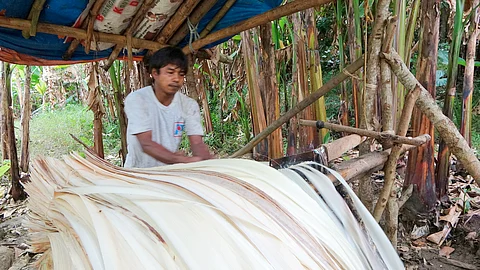
- NEWS
- the EDIT
- COMMENTARY
- BUSINESS
- LIFE
- SHOW
- ACTION
- GLOBAL GOALS
- SNAPS
- DYARYO TIRADA
- MORE

Plastics have become indispensable to modern life. They are embedded in almost everything, from household appliances and vehicles to packaging and construction materials.
While plastics have transformed industries and enhanced convenience, their widespread use has led to alarming levels of pollution and waste. Balancing their undeniable utility with environmental responsibility is a growing challenge.
Addressing this issue demands bold innovation and D&L Industries Inc., a publicly listed leader in specialty food ingredients and oleochemicals, is rising to the occasion with a groundbreaking solution. Its subsidiary D&L Polymer & Colours Inc. (DLPC) is set to launch a pioneering plant fiber-plastics technology this year. This innovation integrates natural fibers into plastic products, offering a sustainable alternative for industries that rely heavily on plastics.
The initiative reflects a commitment to environmental stewardship while retaining the functional benefits of plastics that modern society cannot do without.
“We cannot live without plastics, but we also cannot ignore the environmental toll they take. This is where innovation becomes critical,” Lester A. Lao, DLPC’s president and CEO, said during a recent interview.
Abaca innovation
At the core of DLPC’s innovation is abaca, a banana species grown for its fiber instead of its fruit. Abaca fiber is globally recognized for its exceptional strength. Often referred to as the strongest natural fiber in the world, abaca is abundant in the Philippines, a country rich in agricultural resources.
DLPC has developed a technology that processes abaca and other local fibers, such as pineapple, spider lily (bakong) and vetiver, into composites. These materials can replace up to 40 percent of conventional plastics in products ranging from automotive parts to construction materials.
“The Philippines has an endless supply of natural fibers that are mostly deemed as waste,” Lao said. By turning these fibers into valuable components for industry, DLPC is transforming what would otherwise be discarded into a sustainable resource.
This technological breakthrough is the culmination of decades of exploration. Lao recalled that “about 25 years ago, even before the term ESG or sustainability became mainstream, we had already started exploring the potential of abaca fiber as an environmentally friendly alternative to plastics.” Today, that early vision is materializing as the company prepares to introduce its innovation to industries worldwide.
Breaking boundaries
DLPC’s plant fiber-plastics technology represents a significant advancement in polymer science or the study of the properties, synthesis, structure and applications of polymers, large molecules made up of repeating structural units (monomers) that are chemically bonded together.
According to Lao, what DLPC developed is a new material that is arguably breaking the boundaries of polymer science. With its unique characteristics and sustainable aspects, we are convinced that it has the potential to revolutionize the plastics industry.”
For the company, the innovation is not limited to replacing plastic components. It also opens doors for industries to rethink their approach to sustainability. The material’s versatility applies to various sectors, including automotive, construction and even electric vehicles. By offering an eco-friendly alternative, DLPC is helping industries reduce their reliance on traditional plastics without compromising performance or quality.
While the technology is ready for production, Lao acknowledged that the journey is just beginning.
“With the majority of the people in the industry not yet familiar with the technology and its potential applications, we believe that we are exploring uncharted territory with endless opportunities for innovators and pioneers like us. At this point, we believe that we are merely scratching the surface for a multitude of industries,” he said.
Not just a material
DLPC is focused on scaling production and educating customers about the technology’s capabilities. Additionally, the company is in discussions with potential partners interested in adopting sustainable solutions.
Lao emphasized that collaboration will be key to maximizing the technology’s impact.
“What we have developed is not just a material; it’s a solution that could redefine how industries approach sustainability.”
DLPC’s initiative is not just a win for the Philippines but a model for the global business community. By transforming agricultural byproducts into valuable industrial materials, the company demonstrates how local ingenuity can have a far-reaching impact. The use of renewable resources aligns with global efforts to reduce carbon footprints, minimize waste, and transition to circular economies.
“The Philippines has a unique opportunity to lead in this space,” Lao remarked. “Our rich natural resources, combined with innovative technology, can position us at the forefront of sustainable manufacturing.”
By tapping into the country’s rich natural resources and pushing the boundaries of polymer science, D&L Industries is not just creating a new material but also setting the stage for a future where plastics and sustainability coexist. It’s a bold step forward in reimagining what’s possible in the quest for a greener planet.
